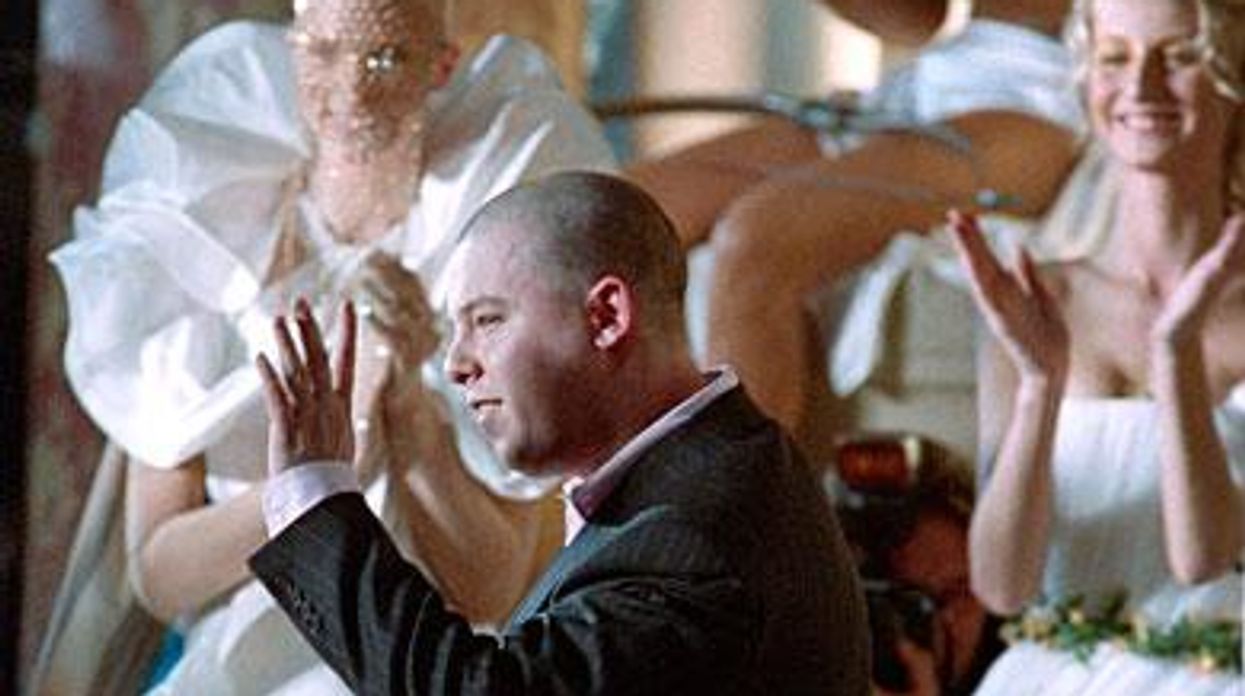CONTACTAbout UsCAREER OPPORTUNITIESADVERTISE WITH USPRIVACY POLICYPRIVACY PREFERENCESTERMS OF USELEGAL NOTICE
© 2025 Equal Entertainment LLC.
All Rights reserved
All Rights reserved
By continuing to use our site, you agree to our Privacy Policy and Terms of Use.
We need your help
Your support makes The Advocate's original LGBTQ+ reporting possible. Become a member today to help us continue this work.
Your support makes The Advocate's original LGBTQ+ reporting possible. Become a member today to help us continue this work.
You had to pity his competitors. Regardless of whether you consider Nicolas Ghesquiere's futuristic panache at Balenciaga or Marc Jacobs's brilliantly modern take on historic glamour, Alexander McQueen's runway spectacles were unrivaled in creating fashion's zeitgeist.
As Lady Gaga debuted her hit single "Bad Romance" at his spring-summer 2010 women's wear show this past October, an army of 10-inch-heel, hoof-like shoes launched an international frenzy from the very moment the first model clopped past the front row of fashion editors.
While the world's financial markets roiled and banks screamed for bailout money, McQueen, the son of a London cabbie, extended a taut middle finger to the culture of branded, conspicuous luxury that helped spawn the mess that we're in. Fashion's enfant terrible was also a purveyor of exorbitant goods, but that always seemed beside the point.
"He was a commercial brand, but he never compromised his artistry," Arianne Phillips, Madonna's longtime stylist, said on the morning in February that McQueen's body was found at his London apartment after the designer committed suicide at age 40. "When I think of corporate success, I think of compromised integrity. But when you walk into a McQueen store, you always feel like it was truly his vision."
His was not always a palatable vision--unless you were willing to move past the knee-jerk reactions that come with first glances. "Highland Rape," the McQueen fall 1995 collection that symbolized the bastardization of Scotland's culture by its neighbor to the south, featured models who appeared to have been brutalized by unknown assailants. Subsequent shows always delivered something outrageous, and they were fit for a fashion journalist's lead: amputees strutting with prosthetic legs, mouths bleeding with cartoonish lipstick, bandaged women stumbling aimlessly, as though they had leapt from the pages of The Snake Pit. Accusations of misogyny naturally followed--not uncommon for a gay designer whose runways stray from the conventionally pretty. But McQueen made it clear that he couldn't have felt more to the contrary about the label people tried to place on him. "Everything I've done," he said in an interview in 2000, "was for the purpose of making women look stronger, not naive."
McQueen's death leaves a void in a world that depended on him to shock and seduce, season after season. It's too soon to say who might succeed him as fashion's next fearless visionary. "It's so unfair," Phillips says. "I can't imagine there's anyone in this industry who's not going to be affected by his death."
"Nicey-nicey just doesn't do it for me," McQueen once quipped. As he was endlessly teased in his youth as "McQueer," his thick-skinned bravado was perhaps inevitable. Even if at heart he was a sensitive genius.
From our Sponsors
Most Popular
Bizarre Epstein files reference to Trump, Putin, and oral sex with ‘Bubba’ draws scrutiny in Congress
November 14 2025 4:08 PM
True
Jeffrey Epstein’s brother says the ‘Bubba’ mentioned in Trump oral sex email is not Bill Clinton
November 16 2025 9:15 AM
True
Gay makeup artist Andry Hernández Romero describes horrific sexual & physical abuse at CECOT in El Salvador
July 24 2025 10:11 AM
True
Watch Now: Pride Today
Latest Stories
Democratic officials sue RFK Jr. over attempt to limit gender-affirming care for trans youth
December 24 2025 4:30 PM
Heated Rivalry season 2: Everything we know so far
December 24 2025 3:30 PM
Lillian Bonsignore will be first out gay Fire Department of New York commissioner
December 23 2025 6:21 PM
The HIV response on a cliff-edge: advocacy must drive urgent action to end the epidemic
December 23 2025 2:23 PM
CECOT story pulled by Bari Weiss gets viewed anyway thanks to Canadian streaming service
December 23 2025 2:05 PM
Burkina Faso issues first sentence for 'homosexuality and related practices'
December 23 2025 2:02 PM
Transgender NSA employee files discrimination lawsuit against Trump administration
December 23 2025 12:03 PM
Billy Porter is set to make a 'full recovery' from sepsis
December 23 2025 11:54 AM
Soccer stars Rafaelle Souza and Halie Mace are engaged & the video is so adorable
December 23 2025 10:52 AM
What is 'hopecore' and how can it make life better for LGBTQ+ people?
December 23 2025 10:00 AM
Santa Speedo Run 2025: See 51 naughty pics of the festive fundraiser
December 23 2025 6:00 AM
Instructor who gave U of Oklahoma student a zero on anti-trans paper removed from teaching
December 22 2025 9:36 PM
All about the infamous CECOT prison — on which CBS's Bari Weiss pulled a story
December 22 2025 7:27 PM
Chest binder vendors respond to 'absurd' FDA warning letter: 'Clearly discrimination'
December 22 2025 3:16 PM
Gay NYC Council member Erik Bottcher drops U.S. House bid, will run for state Senate instead
December 22 2025 2:03 PM
Massachusetts removes rule requiring foster parents to support LGBTQ+ youth
December 22 2025 12:55 PM
Dave Chappelle defends Saudia Arabia set: Trans jokes 'went over very well'
December 22 2025 12:33 PM
Texas judge who refused to officiate same-sex weddings sues to overturn marriage equality
December 22 2025 11:41 AM




































































Charlie Kirk DID say stoning gay people was the 'perfect law' — and these other heinous quotes